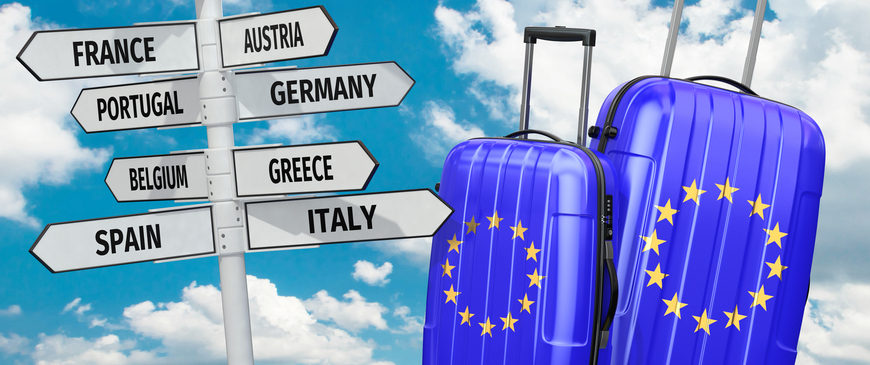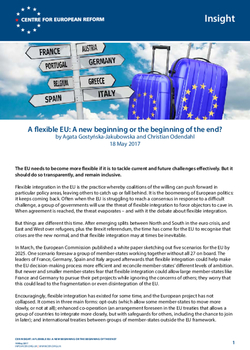
A flexible EU: A new beginning or the beginning of the end?
The EU needs to become more flexible if it is to tackle current and future challenges effectively. But it should do so transparently, and remain inclusive.
Flexible integration in the EU is the practice whereby coalitions of the willing can push forward in particular policy areas, leaving others to catch up or fall behind. It is the boomerang of European politics: it keeps coming back. Often when the EU is struggling to reach a consensus in response to a difficult challenge, a group of governments will use the threat of flexible integration to force objectors to cave in. When agreement is reached, the threat evaporates – and with it the debate about flexible integration.
But things are different this time. After emerging splits between North and South in the euro crisis, and East and West over refugees, plus the Brexit referendum, the time has come for the EU to recognise that crises are the new normal, and that flexible integration may at times be inevitable.
In March, the European Commission published a white paper sketching out five scenarios for the EU by 2025. One scenario foresaw a group of member-states working together without all 27 on board. The leaders of France, Germany, Spain and Italy argued afterwards that flexible integration could help make the EU decision-making process more efficient and reconcile member-states' different levels of ambition. But newer and smaller member-states fear that flexible integration could allow large member-states like France and Germany to pursue their pet projects while ignoring the concerns of others; they worry that this could lead to the fragmentation or even disintegration of the EU.
Some states worry flexible integration could lead to fragmentation or even disintegration of #EU
Encouragingly, flexible integration has existed for some time, and the European project has not collapsed. It comes in three main forms: opt-outs (which allow some member-states to move more slowly, or not at all); enhanced co-operation (an arrangement foreseen in the EU treaties that allows a group of countries to integrate more closely, but with safeguards for others, including the chance to join in later); and international treaties between groups of member-states outside the EU framework.
Opt-outs have allowed the EU to revise the treaties even when one or two member-states have not wanted to be bound by the new rules. The UK and Denmark, for example, have a permanent opt-out from the euro. Some EU laws also provide so-called derogations which allow member-states to deviate temporarily from common rules. In the case of carbon emissions trading, countries that are particularly reliant on coal have derogations to lower the economic impact of reduced emissions.
The EU treaties also allow a group of member-states to integrate more deeply than the rest. Member-states can use 'enhanced co-operation' in policy areas covered by the EU treaties, as long as these are not exclusive EU competences (enhanced co-operation would not be possible in an area covered by the EU's common commercial policy, for example). In 2010 a group of EU countries (currently 17) adopted a regulation allowing couples from different member-states to choose which country's law should apply to their divorce or separation. All EU countries bar Spain and Croatia also take part in a common system of patent protection. The treaties also allow a group of member-states to use enhanced co-operation in justice and home affairs. In April 2017, after lengthy efforts to find consensus among the 28 failed, 16 member-states notified their intention to use enhanced co-operation to establish a European Public Prosecutor’s Office to combat crimes against the EU’s financial interests. And in the defence field, so-called 'permanent structured co-operation' (PESCO) is a special form of enhanced co-operation designed to enable member-states that want to integrate their defence policies more closely to do so.
Enhanced co-operation allows a group of member-states to integrate more deeply than the rest
Alternatively, a group of member-states can conclude international treaties outside the EU framework. In 2011, when David Cameron vetoed a treaty change designed to impose stricter budgetary discipline on member-states, 25 states concluded a 'fiscal compact' that was not an EU treaty. The eurozone members established the European Stability Mechanism (ESM), which offers financial assistance to eurozone countries in need, outside the EU treaties. Member-states may also conclude an international treaty when a group of EU countries want to co-operate more closely, but do not think that all member-states can fulfil the responsibilities arising from that co-operation. Germany, France and the Benelux countries initially pushed for a borderless Schengen area outside the EU framework to bypass Italy; they feared that opening borders with Italy could result in illegal immigration from North Africa.
Enhanced co-operation has clear advantages over international treaties; it allows more ambitious member-states to co-operate more closely, but it is also open to non-participating member-states that choose to join at a later stage. There is less risk of the EU fragmenting, because a minimum of nine members are needed to trigger enhanced co-operation. The European Commission can refuse to allow enhanced co-operation if it breaks single market rules. Non-participating member-states have a say in whether enhanced co-operation can proceed: the Council of Ministers must agree to it by a qualified majority, and the European Parliament must consent. Non-participating member-states can also attend meetings of the Council of Ministers when participating members discuss enhanced co-operation, though they cannot vote.
Collaboration outside the #EU treaties is less transparent and inclusive
In contrast, collaboration outside the EU treaties is less transparent and inclusive. But the election of France's new president, Emmanuel Macron, could give the idea of deepening co-operation among a group of member-states outside the EU treaties new impetus. Macron thinks that the eurozone should have its own parliament and budget. Such a budget, together with stronger co-ordination of economic policies and financial regulations, could help to stabilise the eurozone. But these innovations could not be accommodated within the current EU treaties. They would either require treaty change (for which most member-states have no appetite) or an international treaty between the euro's 19 members. EU members that are legally obliged to adopt the euro in future (most of them in Central Europe) might find themselves without a seat in these new eurozone institutions, and unable to influence policies. Net contributors to the EU budget might decide to re-allocate their funds from the EU-27 budget (where it benefits poorer member-states outside the eurozone) to a eurozone budget from which they themselves might benefit.
More frequent recourse to international treaties among a group of member-states could reduce the incentive to seek consensus among the EU-27. EU decision-making is often based on package deals; that is to say countries offer mutual concessions in different policy areas. Smaller states can often wield significant influence in this horse-trading. But large member-states could use the threat of negotiating inter-governmental treaties to circumvent opponents or get them to back down. In the short term this might enable the EU, or core members of it, to move forward more quickly. But it could also boost eurosceptics in other member-states: they already argue that the EU is undemocratic because the big member-states dictate the rules.
Despite Germany’s increasing weight in the EU (which Brexit will accentuate), it is aware of many others' fears of German hegemony, and so far prefers to use the instruments available in the EU treaties rather than going outside them. But in times of acute crisis, using EU instruments can be too cumbersome, time-consuming or outright impossible. The EU treaties provide that enhanced co-operation is only possible in areas covered by the EU treaties, but the treaties did not foresee the need for instruments to help Greece deal with the sovereign debt crisis in 2010, for example. The EU treaties define enhanced co-operation as a measure of last resort which member-states should turn to only after they have established “that the objectives of such co-operation cannot be attained within a reasonable period by the Union as a whole”; but they do not define what ‘reasonable’ means. So far, member-states have always tried to reach consensus for several years before turning to enhanced co-operation. In a future crisis the EU may not have that much time.
#EU27 should seek consensus but need agreed approach to flexible integration when all else fails
The EU should agree in advance on how to respond. Where possible, the Union should seek consensus between the 27. But it also needs an agreed approach to flexible integration when all else fails. Newer and smaller member-states would find it easier to accept flexible integration if it were designed to be open to non-participating member-states, and protected them from discrimination.
Member-states could reach a political understanding with the Commission and the European Parliament to make enhanced co-operation more user-friendly in times of crisis. If it were easier to use enhanced co-operation when there was no consensus among the 27, member-states might be less tempted to negotiate international treaties in policy areas covered by the EU treaties. The country holding the presidency of the Council could consult the Commission and the Parliament case by case, and determine how long the EU-27 should keep trying to reach consensus – perhaps as little as three months in an emergency. If by the end of that period there were no prospect of consensus at 27, then nine or more member-states could trigger enhanced co-operation.
If an international agreement is the only realistic way for member-states to address a crisis, then the agreement must safeguard the interests of non-signatory EU members. The European Court of Justice ruled in 2012 that any international agreement among member-states must not violate the EU treaties or undermine the rights of non-participating members. But EU capitals should go further in mitigating risks to the EU’s integrity. They should ensure that non-participating member-states have observer status in the negotiations on such international agreements. If any treaty instituted regular meetings of the parties on policy or implementation issues, the European Council president should be able to attend, and to prompt European Council discussion of decisions that he judged would damage the EU's integrity. Non-signatories should also be able to accede to a treaty later. International treaties could also contain ‘sunset clauses’, whereby the treaty would lapse if the signatories did not integrate it into the EU legal framework within a specified period.
Flexible integration in #eurozone should be kept to minimum - core policies to apply to all members
Flexible integration inside the eurozone should be kept to a minimum. It should be possible for some euro countries to pool policies or funds such as joint unemployment insurance. But the core policies to ensure financial and economic stability should always cover all eurozone countries. Member-states must not use flexible integration as an excuse to force countries like Greece out of the euro. The German finance ministry toyed with this idea before the eurozone and Greece agreed on an assistance package in July 2015; Greece worries that the debate about flexible integration could revive these ideas.
There are always two sides to every story. EU member-states with greater resources, capabilities and ambitions are more eager to co-operate, even if that means not having all 27 on board. Smaller and newer member-states fear that they may lose out from more flexible integration in the EU. Flexible integration could indeed increase divisions among member-states and lead to disintegration if it is used to exert pressure or simply bypass objectors. But if managed well and subjected to appropriate safeguards, flexible integration could help member-states overcome the current gridlock in the EU and pull it out of its current malaise, while keeping the EU united.
This insight is part of ongoing research supported by a grant from the Open Society Foundations.
Agata Gostyńska-Jakubowska is a research fellow and Christian Odendahl is chief economist at the Centre for European Reform.


Add new comment